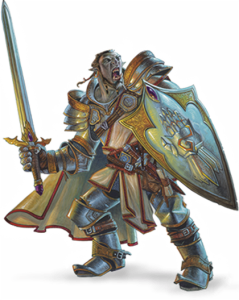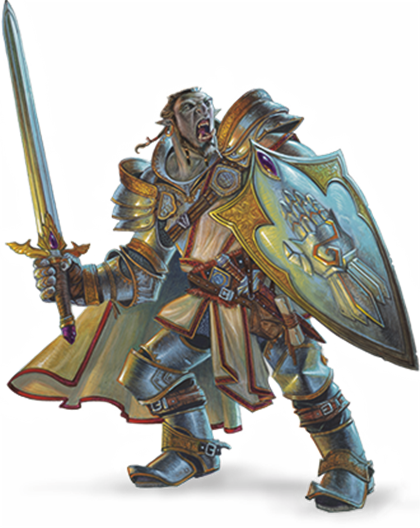Paladin Class Details:

Holy knight and heavenly spellcaster, the paladin wars for good and order. Further, we discuss class details of the paladin.
A woman in plate armor lays down her sword and shield to help a mortally wounded man. Divine brightness shines from her hands, and the man’s wounds heal. A dwarf crouches behind an outcrop and watches an orc war band celebrate its recent triumph. He sneaks up on them and whispers an oath, killing two orcs before they notice him.
An elf chuckles with glee as his silver hair sparkles in a light beam. His spear sparkles as he jabs a twisted behemoth until his light overcomes its darkness. Regardless of origin or objective, paladins swear to fight evil. A paladin’s oath is a powerful link, whether pledged before a god’s altar and a priest, in a sacred glade among nature spirits and fey beings, or in desperation and grief with the dead as the only witness. It makes a committed warrior a blessed champion.
What Justifies Righteousness?
A paladin promises to uphold justice and morality, stand with good against evil, and hunt evil wherever it lurks. Different paladins focus on various facets of virtue, but their oaths bind them. Many paladins worship benevolent gods, but a paladin’s power comes from a commitment to justice.
Paladins spend years perfecting weapons and armor. Their fighting talents are secondary to their magical strength, which heals the sick and injured, slays the evil and undead, and protects the innocent and those who join them in the fight for justice.
BREAKING YOUR OATH:
Even the most morally upstanding paladin is susceptible to making mistakes, despite their best efforts to uphold the most significant ethical standards. Occasionally, a paladin will break their pledge because the right road is too complicated, because they have to choose between two evils, or because they are overcome with emotion.
When a paladin recognizes that they have broken a pledge, they will typically seek absolution from a priest who practices the same faith as them or from another paladin who adheres to the same order. As a gesture of repentance, the paladin may choose to keep a prayer vigil throughout the night, or they may decide to fast or engage in some other form of self-denial. After performing a ritual that involves confession and asking for forgiveness, the paladin will begin again. If a paladin disobeys their oath willingly and gives no indication that they are sorry for their transgression, the punishments may be more severe. An impenitent paladin may be required to change classes at the DM’s discretion or select the Oath-breaker paladin option detailed in the Dungeon Master’s Guide.
Characteristics of a Class:
The following are some advantages unique to paladins:
Score a Points Success!
Damage Rolls: 1d10 per paladin level
Damage at Level 1: 10 + (Constitution modifier)
After reaching level 1, a paladin’s hit points increase by 1d10 (or 6) plus their Constitution modifier.
Proficiencies:
Armor: All forms of armor and shields
Weapons: Traditional weaponry and modern military hardware
Tools: No Available Equipment Wisdom, Charm as Saving Throws
Skills: Select any TWO of the following: athletics, insight, intimidation, medicine, persuasion, or religion
Equipment:
In addition to the gear your background automatically gives you, you also start with the following:
Both (a) a sword and a shield, or (b) a pair of swords and a pair of shields
The choice between five spears and any other simple melee weapon.
(a) a pack worn by a priest, or (b) a bag worn by an explorer
Sacred emblem and chain mail
The Holy Sense:
Experiencing great evil is like smelling a putrid odor, whereas sharing powerful good is like listening to music in heaven. It is possible to become more attuned to these energies by deliberate action. Until the end of your next turn, you may pinpoint the exact location of any non-total-cover celestial, fiendish, or undead within 60 feet of you.
You recognize the category (celestial, demon, or undead) but not the identity of any being whose presence you detect (the vampire Count Strahd von Zarovich, for instance). Similar to the hallow spell, you can see the existence of any hallowed or profaned location or object within the same radius. You can use this ability once per day plus your Charisma modifier. After a lengthy nap, you’ll be back to full strength.
Put your hands together:
Your holy hands can mend all that ails us. When you rest for a while, your healing power returns to complete. With that pool, you can heal an amount of health equivalent to your paladin level minus 5. As an actor, you can touch an injured creature and use the pool’s power to heal hit points equal to your current maximum.
The alternative is to use five healing points to remove one illness or poison from the target. While using Lay on Hands can expend hit points individually to treat numerous ailments or counteract multiple toxins. For some reason, undead and artificial beings are immune to this ability.
An evil alignment because of their role as protectors against those who would do evil. Most are charitable and just. Consider how your alignment affects your holy quest and conduct before gods and mortals. Your oath and alignment may be in sync or represent norms you haven’t met.
How to fight:
At level 2, you choose a fighting style to be your specialty. Pick one of the options below. You can only select a Fighting Style once, even if you get to choose again later.
Defensive line:
When you wear shields, your AC goes up by 1 point.
Fighting:
You get a +2 bonus to damage rolls with a melee weapon when you only have it in one hand and no other weapons.
Great Battle Weapon:
You can reroll the die and utilize the new roll if you roll a 1 or 2 on the damage die for an attack you make with a melee weapon you hold in two hands. To get this benefit, the gun must be able to be used with two hands or be versatile.
Protection:
When a creature you can see attacks a target within 5 feet of you that isn’t you, you can use your action to make the attack roll worse. It would help if you had a shield in your hands.
Spellcasting:
By the second level, you’ve learned to summon holy magic through spiritual practice to cast spells as a cleric. The general laws of spellcasting may be found in Spells Rules, while the paladin spell catalog can be found at Spells Listing.
Spell Preparation and Casting:
The Paladin table displays the number of spell slots available for casting paladin spells. To perform a 1st level or higher paladin spell, you must use a place of the spell’s level or higher. When you end a lengthy rest, you restore all wasted spell slots. You make a list of paladin spells you can cast by choosing from the paladin spell list. Choose several paladin spells equal to your Charisma modifier plus half your paladin level, rounded down (minimum of one spell). The spells must be of the identical level as your spell slots.
For example, a 5th-level paladin has four 1st-level spell slots and two 2nd-level. With a Charisma of 14, you can prepare four spells of the first or second level in any combination. If you qualify, you can cast the 1st-level spell to cure wounds of either a 1st-level or a 2nd-level slot. Launching the attack does not remove it from your prepared spells list. You can update your list of prepared spells when you end a long rest. Preparing a new list of paladin spells necessitates time spent in prayer and meditation: at least one minute for each spell level on your list.
Capability to Cast Spells:
Charisma is your spellcasting ability for paladin spells, as the strength of your convictions determines their power. When a spell refers to your spellcasting ability, you use your Charisma. In addition, your Charisma modifier is used when determining the saving throw DC for a paladin spell and when making an attack roll with one.
Spell saving DC = 8 + proficiency bonus + Charisma modifier:
Spell attack modifier equals your proficiency bonus multiplied by your Charisma modifier.
Spellcasting Concentration:
You can utilize a holy sign (see the section on adventuring equipment) as the focus of your paladin spellcasting. Heavenly Wrath
As of the second level forward, when you hit an enemy with a melee weapon attack, you can spend one spell slot to inflict radiant damage in addition to the damage from your weapon. The bonus damage ranges from 2d8 for a 1st-level spell slot to 5d8 for a 5th-level spell slot. If the victim is a zombie or a fiend, the damage rises by 1d8, up to a maximum of 6d8.
Divine Wellness:
By the third level, the holy magic in your blood has rendered you immune to illness.
A Solemn Vow:
Third-level Paladins take the eternal pledge that marks them as such. You have been in the preliminary stage until this point, dedicated to the road but not yet pledged to it. You may now select either the Oath of Devotion described at the end of this class description or one of your devising. Your decision gives you advantages at levels three, seven, fifteen, and twenty. Vow spells and the Stream Divinity ability are examples of such features.
Spells of Oath:
There is a group of spells that correspond to each oath. These spells become available to you at the level ranges noted in the oath’s description. Once you learn an oath spell, you will always be ready to use it. In regards to the daily limit on spellcasting, oath spells are exempt.
Devotion aura:
If you are level 7 or higher, you and any friendly species within 10 feet of you are immune to charm effects while you are awake. The radius of this aura expands to 30 feet at level 18.
Integrity of Character:
At level 15, you’ll have permanent protection from evil and good spells.
Nimbus, Holy!
At level 20, you can use an action to give off a ray of sunlight. A brilliant light emanates from you for 1 minute within a 30-foot radius, and a dimmer light extends forth another 30 feet beyond that. Nimbus, Holy!
At level 20, you can use an action to give off a ray of sunlight. A brilliant light emanates from you for 1 minute within a 30-foot radius, and a dimmer light extends forth another 30 feet beyond that. When exposed to the light, an enemy creature takes ten radiant damage at the beginning of its turn. Additionally, your saving throws versus spells thrown by fiends and the undead are improved during the duration.
Once this function is used, we can not use it again.
Open Sea Oath:
Warriors, swashbuckling sailors, and guardians on the move who yearn for the excitement of an uncharted ocean might consider taking the Oath of the Open Sea. Paladins who take this Oath are compelled to seek out adventure and mystery across and beneath every boundless maritime expanse. They take a stance against those who would deny liberty to fellow adventurers.
These watchers deeply respect the sea and its natural wonders, and they often sacrifice and pray to supernatural beings like the Wild-mother and the Storm lord. They also answer the call to hunt the terrible animals that scare the seafarers and beach dwellers with their frequent acts of violence and malice.
IT CONTAINS TENETS OF THE OPEN SEA:
Freedom can be a noble trait or a selfish need. Freedom is the highest calling for paladins who take the Oath of the Open Sea, and it is a gift to be given to everyone. Nothing is more valuable than one’s freedom to live an entire life. People should be able to choose their route in life without being stifled. Whoever seeks to dominate others will be struck. Keep your faith in the clouds. The directing force of a brisk wind. Indications of an impending storm, audible in the form of low-frequency rumbling.
Adapt quickly, much like water. The ocean’s fluid nature allows it to flow around or over any barrier. They excavate the ground to unearth long-buried secrets or swallow the truth to keep it buried. In other words, if you accept this malleability, you’ll be prepared for anything. Find out what’s out there in the uncharted territory. There are a lot of unknowns in this world. You can find the path to greatness and the exposure of those hiding their malicious activities from pursuing mysterious goals.
Vow Magic:
There are oath spells available to you at the paladin levels shown in the Oath of the Open Seas Spells table. For more information on oath spells and their function, go to the Sacred Oath class feature. Manifest Divinity
The following two Channel Divinity possibilities are yours when you take this pledge at the third level.
A layer of Seawater:
Action: You summon a sea fog that extends forth from you 20 feet in all directions. As you walk, the mist follows you and concentrates on you so that everything around you is indistinct. Treat the environment as mildly concealed for yourself and any creatures within five feet of you. The fog lasts 10 minutes, wraps over obstacles, and stays put until the effect is turned off (no action required).
The Tides’ Fiery Fury:
For an additional minute, your strikes will be bolstered by the mighty strength of the waves. When you successfully hit a creature with a physical attack, you can push it 10 feet away from you once per turn for the duration. If you make an opponent into an object or another creature, they take battering damage equal to your Dexterity modifier. The Liberation Aura
At the 7th level, you gain the ability to infuse adjacent creatures with the vitality of motion. To the extent that you are not wounded, you and up to five animals within 10 feet of you are immune to grappling and restraint and do not take any damage from being submerged. Unless magical shackles tie them, creatures that are grabbed or bound when they enter the aura can spend 5 feet of movement to escape automatically. Auras affect beings within 30 feet of you if you reach level 18 in this class.
Chaotic Seas:
At the 15th level, when an enemy walks into or out of your grasp, you can use the crashing seas as a reaction. If the creature’s Strength saving throw is unsuccessful against your spell save DC, it gets 1d12 bludgeoning harm and is knocked prone.
Legendary buccaneer:
At level 20, you get the ability to temporarily assume the heroic persona of legendary sea captains by connecting with their spirits. You can receive the following benefits for 1 minute when you do the action of embracing these sea spirits:
1. You are climbing at a rate equal to your walking speed and benefit from Strength (Athletics) checks. If you have a rising speed, you will double it.
2. Whenever you make an attack roll against a demon and no other creatures are within 5 feet of you, you have an advantage.
Both the Dash and Disengage actions are available to you as free bonuses. All Dexterity checks and saving throws against visible effects grant you an advantage.
Once this function has been used, you can not use it again.
Read Also: Monk



